Continue reading for our analysis...
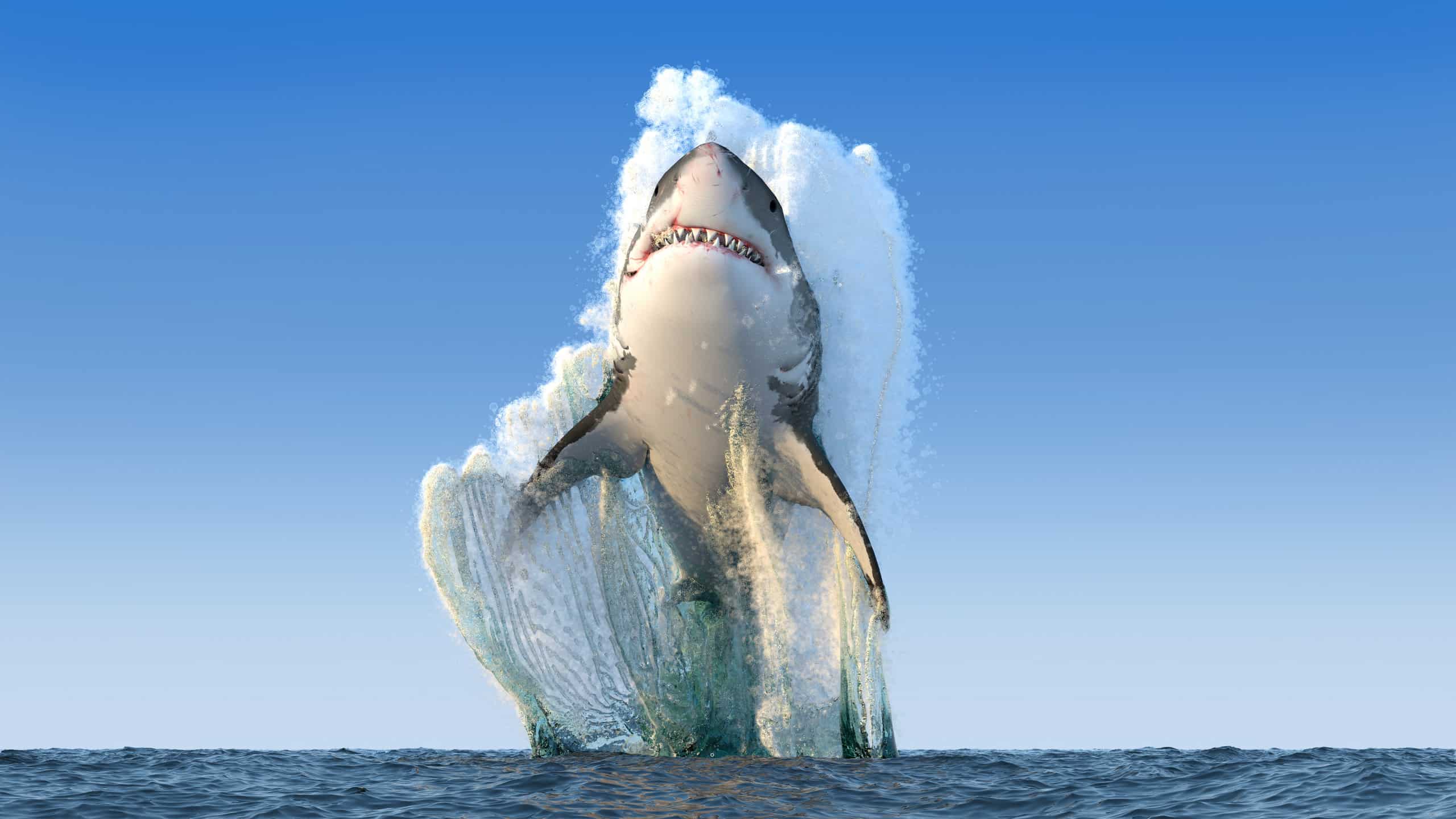
Did you know that Great White Sharks can jump out of the water? These giant ocean predators launch themselves up to catch their prey off guard.
“This daily breaching behavior lasts the entire South African winter and may be unique to Seal Island,” a host from Discovery UK says as he narrates over incredible footage.
These sharks live in False Bay, an area of water near Cape Town in South Africa. Seal Island is a granite island that is home to many, many fur seals. Great White Sharks love to eat these guys for lunch and breaching out of the water is one way that they catch them by surprise.
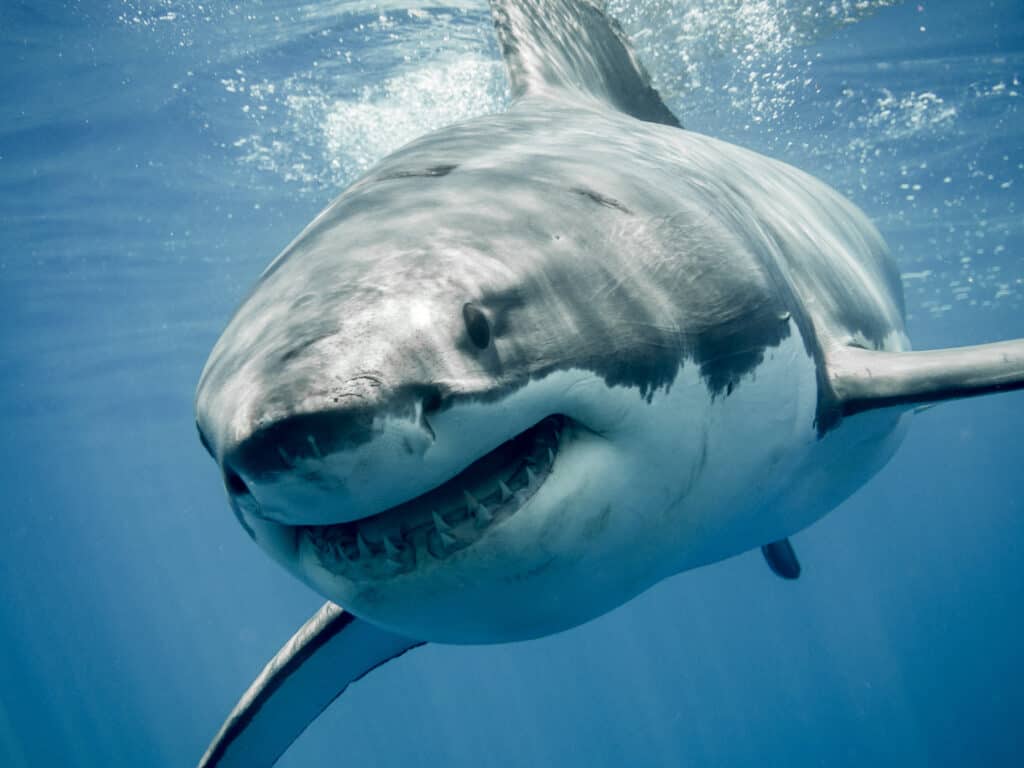
The Great White Shark (
Carcharodon carcharias) is one of the largest predatory sharks in the world.
©Ramon Carretero/Shutterstock.com
One shark that researchers have named “Colossus” is not known for breaching. As a very large shark, this animal prefers to feed underwater. But researchers and observers took a boat out near Seal Island, hoping to find Colossus engaging in the behavior that is so common in this area.
The boat pulls a decoy behind it, hoping to entice Colossus to come up. One of the scientists is nearby on an underwater structure to observe and record the shark’s behavior.
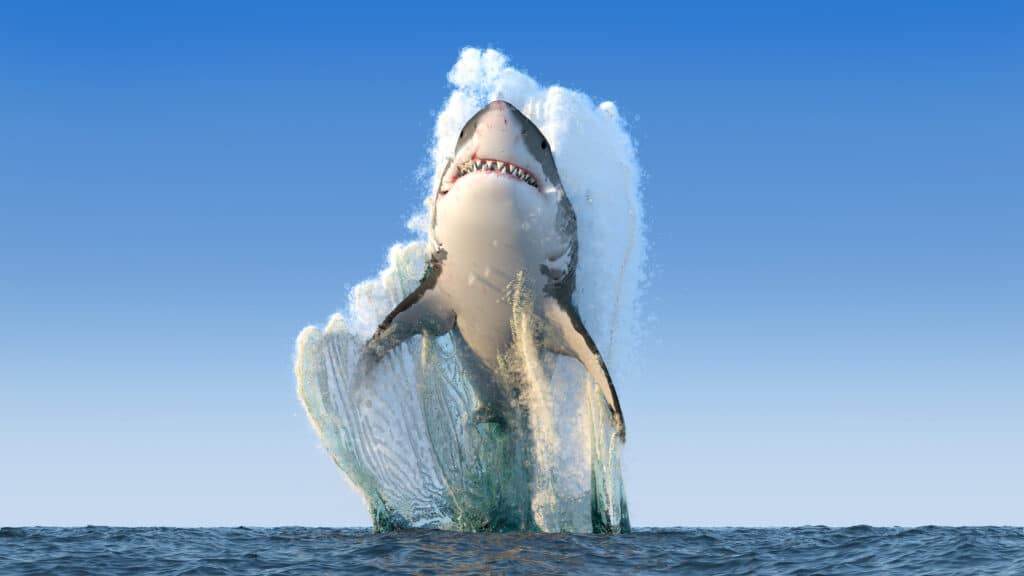
Great white sharks launch from the ocean to catch their prey.
©Alexyz3d/Shutterstock.com
Colossus Sightings
Success! Colossus swims up at high speeds to go after the decoy. Breeching out of the water, you can clearly see the shark’s mouth, gills, and even dorsal fin in the air. The decoy is captured in its powerful jaws. Because the team was ready for this, they were able to capture the breach on camera.
Cheering erupts on the boat. They put out another decoy for Colossus. Even though Colossus hasn’t been in the area long, it’s likely that he’s seen other sharks have success feeding this way.
“In only a few weeks here, he’s learned that launching these surprise attacks is not only the best way to catch a seal, it’s also the best way to beat rival sharks to the punch,” says the narrator.
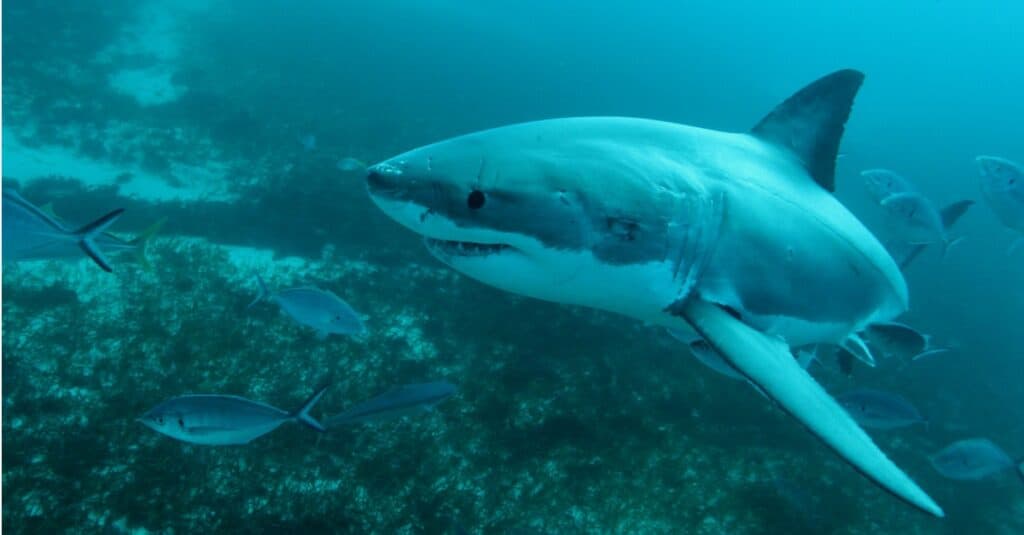
Great white shark pups are big fans of lobster and crab, as well as smaller fish and sharks
©iStock.com/Alessandro De Maddalena
The giant shark continues to amaze the team on the boat with his breaching behavior. Some of the leaps were so impressive that almost the shark’s entire body was out of the water. Fortunately, the team captured the stunts in both video and still photos.
Great White Shark vs Tiger Shark: Who Would Win?

The Great White Shark (Carcharodon carcharias) and the Tiger Shark (Galeocerdo cuvier) are two of the largest predatory sharks in the world, and both have a reputation for being powerful hunters. However, if these two species were to come into conflict, who would come out on top?
In terms of size, the Great White Shark is generally larger, reaching lengths of up to 20 feet and weights of up to 5,000 pounds, while Tiger Sharks typically grow to around 16 feet in length and 2,000 pounds in weight. This size advantage gives the Great White Shark a significant advantage in any physical confrontation, as it is better equipped to overpower its opponent.
If a confrontation were to occur between a Great White Shark and a Tiger Shark, the Great White Shark would likely come out on top due to its larger size, stronger bite, and solitary hunting behavior. However, the Tiger Shark should not be underestimated, as it is an extremely agile and adaptable species that can adapt to a wide range of environments.
Ultimately, the outcome of a confrontation between these two species would likely depend on the specific circumstances and the individual animals involved.
Where Do Great Sharks Live?
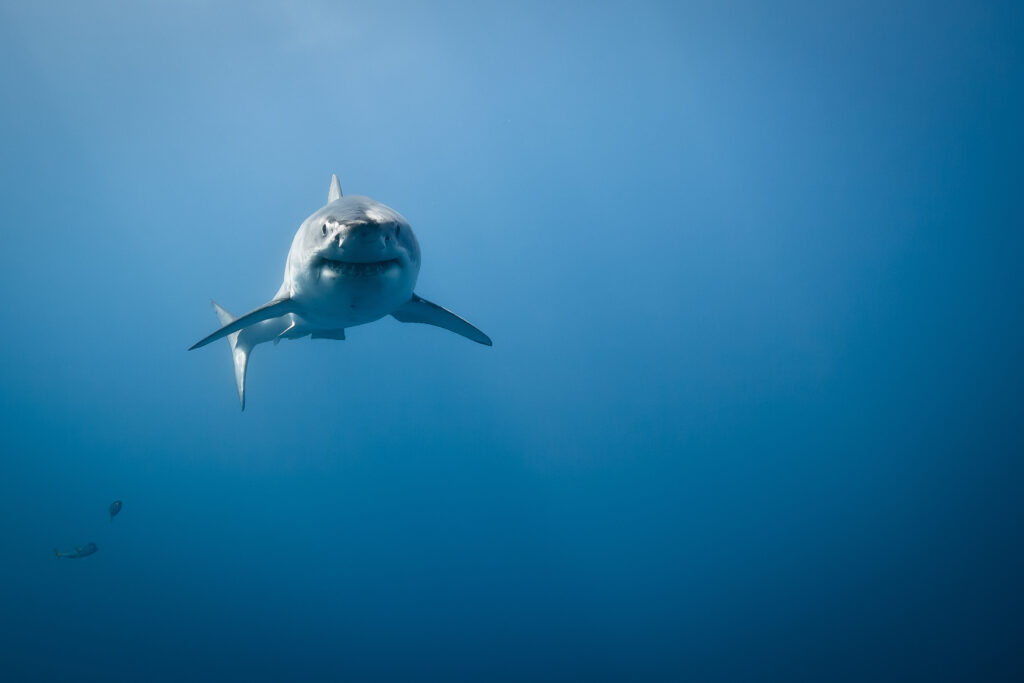
Great white sharks can be found in all of the world’s Oceans except for the Arctic and Southern Oceans.
©iStock.com/vladoskan
Great white sharks can be found in almost all coastal and offshore waters that have a water temperature between 54 and 75 °F. There is, however, a greater population of great whites that can be found in great concentrations in the United States.
Great white sharks are found in the following regions:
- U.S Pacific ranging from Alaska to California
- The Pacific coast of Mexico
- South Africa
- Japan
- Oceania
- Chile
- The Mediterranean including the Sea of Marmara and the Bosporus
They are found both near the shore and in coastal waters. Great white sharks can be found migrating seasonally between different habitats.
Lifespan: How Long Do Great White Sharks Live?
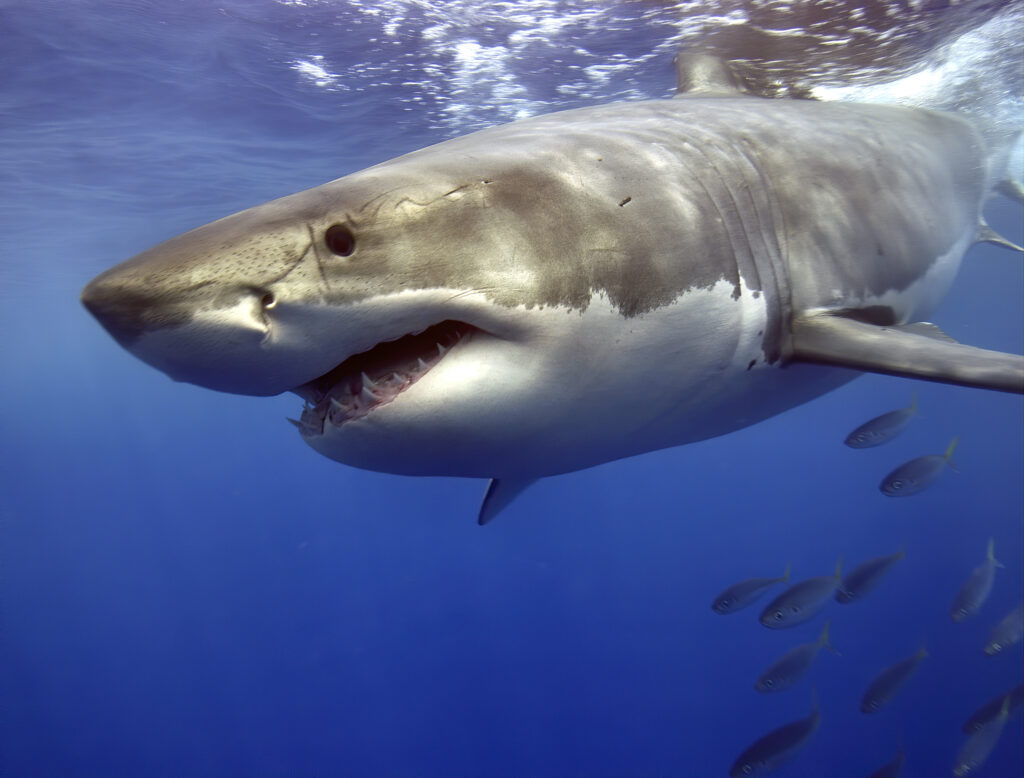
Some scientists believe great whites could reach ages of up to 100 years old under optimum conditions.
©iStock.com/Martin Heyn
Great White Sharks have a lifespan of approximately 70 years or more. The exact lifespan of these animals is not well understood, as they are difficult to study in the wild. However, based on the few studies that have been conducted, it is estimated that Great White Sharks can live for 70 years or more, with some individuals possibly reaching the age of 100 years or more.
The long lifespan of Great White Sharks is one of the reasons why they are considered a vulnerable species. As long-lived species, they have a low reproductive rate and take a long time to reach sexual maturity, making them vulnerable to overfishing and other forms of human exploitation. In addition, because they are apex predators, the loss of these animals can have a profound impact on the entire ocean ecosystem.
Despite their long lifespan and the important role they play in the ocean ecosystem, there is still much that scientists do not know about Great White Sharks. Further research is needed to better understand their biology, behavior, and populations, as well as to develop effective conservation measures to protect this important species.
Great White Shark vs Giant Squid: Who Would Win?
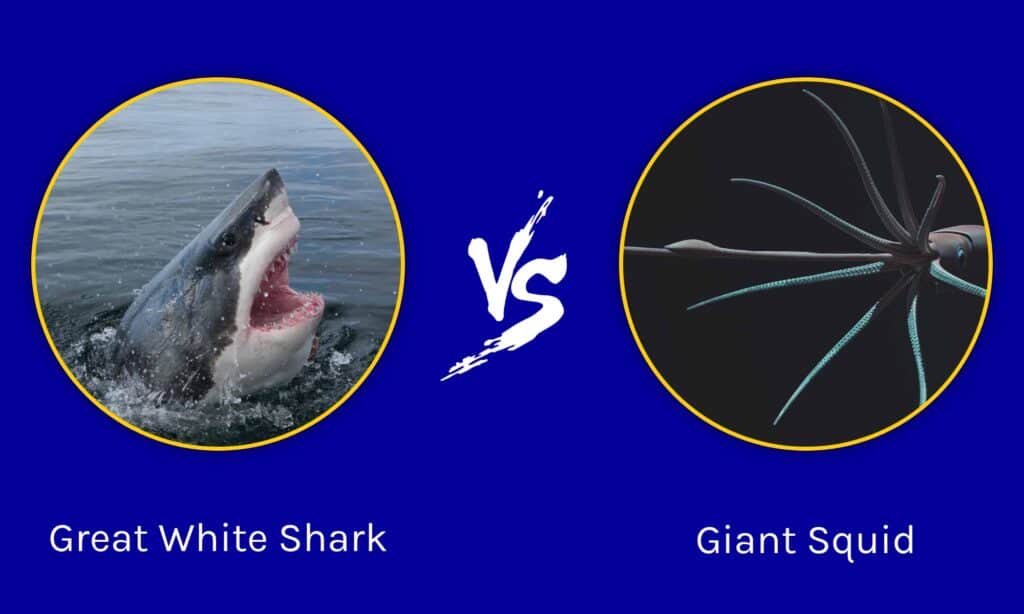
The anatomy and the sheer size of the great white shark and a giant squid are some of the key differences. The great white shark is a huge, cartilaginous fish that can grow over 20 feet long and can weigh as much as 5,000 pounds. On the other hand, we have the giant squid which is a large invertebrate with a maximum size of 40 feet weighing a total of 600 pounds.
Despite the dramatic size difference, due to other factors discussed in this article: Great White Shark vs Giant Squid the giant squid would come out victorious!
Is It Normal For Sharks To Jump Out Of The Water?
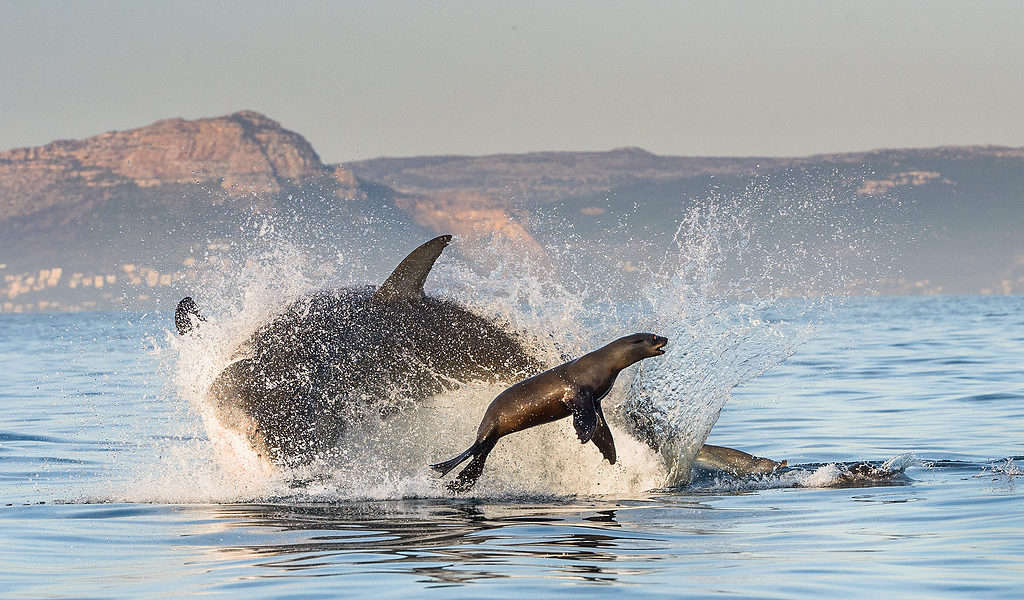
A great white shark will sometimes breach in order to hit the animal it is pursuing in hopes of incapacitating it.
©iStock.com/USO
Yes, it is normal for a shark to jump out of the water. This activity is called a breach. When a great white shark is pursuing prey such as a seal or marine animal, it can reach speeds up to 40 mph and will typically fly up to 10 feet in the air. When it hurls itself at the victim, the goal is to hit the animal so hard that it is incapacitated. Studies have suggested that the success rate of this hunting practice for great white sharks is nearly 50%. However, it causes the shark to exert a massive amount of energy, so it is not common to witness. Taking the risk may depend on the prey within the crosshairs of the hunting shark. Certain prey may not be worth the energy expenditure.
Some sharks have been recorded breaching as high as 16 feet in the air. The types of sharks that jump the most often are great white sharks, spinner sharks, mako sharks, and thresher sharks.
More Awesome Shark Videos You Might Enjoy
Sharks are one of the most ferocious predators in the oceans. Not even the largest and fastest of aquatic animals can escape the relentless pursuit of a hungry shark. In the next clip, you can witness a vicious pack of tiger sharks ripping a marlin to shreds, all while fishermen are attempting to reel it in!
Thank you for reading! Have some feedback for us? Contact the AZ Animals editorial team.







